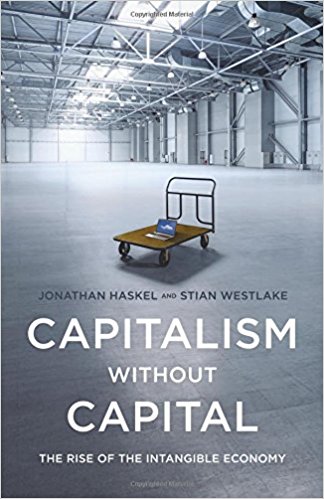You have /5 articles left.
Sign up for a free account or log in.
 Capitalism without Capital: The Rise of the Intangible Economy by Jonathan Haskel and Stian Westlake
Capitalism without Capital: The Rise of the Intangible Economy by Jonathan Haskel and Stian Westlake
Published in November of 2017.
What makes your university valuable?
Is it the buildings? The land that the campus sits on? The computers in the offices?
The weird truth is that every college or university is only as valuable as people believe it is valuable. The value of an educational institution does not reside in the physical things that it possesses.
Rather, the value of a university is a function of the quality of wholly intangible goods. A university, after all, is only as valuable as the ideas and abilities and potential of its student, faculty, and staff. Remove the people, and a college or university is worth hardly anything at all.
What is most interesting about reading Capitalism without Capital is learning how the world’s most successful companies are following a path laid down by the world’s best universities and colleges. Companies that are built on intangible assets, such as computer code or propriety processes or services, are now the world’s most valuable companies.
The reason, according to Capital with Capitalism, is that company products and services that are intangible are also scalable. When Netflix moved from a business based primarily on mailing physical DVDs to streaming video the company was able to easily expand its service across the world. The marginal cost of one more Google search or Facebook post, or download of Adobe’s Creative Suite, is close to zero.
Industries built around software, algorithms, and data also tend favor dominant players. Airbnb get more valuable the more properties that are listed on the platform. The reason to choose Uber is that there are more drivers. Microsoft paid $26 billion for LinkedIn in 2016 because LinkedIn had data on the 422 million users on its platform.
The world’s most valuable companies mimic higher education in some tangible ways. The offices of tech companies are often called campuses. A designation of a “fellow” is often a highly honorific, and remunerative, title at many companies. The culture of long-range thinking and investigator autonomy that has its origins in higher education faculty has migrated to the research labs of corporations, with a straight path from yesterday’s Xerox PARC and Bell Labs to today’s GoogleX.
I found a great graphic marketwatch.com (see below) that shows the corporate migration of value from tangible to intangible goods over the past 100 years. In 1917 the world’s most valuable company was U.S. Steel. Today, the world’s most valuable company is Apple. An iPhone X sells for $999, but costs Apple only $357.50 to make. The main value of the iPhone is in its design, software, and brand image.
Capitalism without Capital is one of those books that I wish was on nightstand of presidents, provosts, and trustees. The book does a great job of enumerating how knowledge-based companies create value by prioritizing employee loyalty, productivity, and happiness. The best companies not only offer free snacks, but provide opportunities for advancement and skill building.
How many universities or colleges treat all the people who work at the institution as a strategic asset?
The entrenched caste system of higher education, where an ever smaller number of tenured and tenure-track faculty work side-by-side with a growing number of adjuncts and staff, all but ensures that not everyone at an institution will be equally valued.
If the value of a college or university is based on the ideas of the people who work at the place, it is hard to believe that only the tenured and tenure-track faculty have valuable ideas.
What needs to happen so that the best minds will continue to want to work at colleges and universities?
What will it mean when technology companies not only offer more money than higher education, but greater autonomy and support for high risk projects (moon shots)?
When will higher education realize that a race to the bottom in educator compensation, security, and status (all those underpaid and insecure adjuncts) is a strategy that will inevitably result in diminished long-term financial resilience?
A college or university is only as valuable as its people.
Capitalism without Capital, although not at all about higher education, should be read as a roadmap by postsecondary leaders for ensuring long-term success.
What are you reading?





